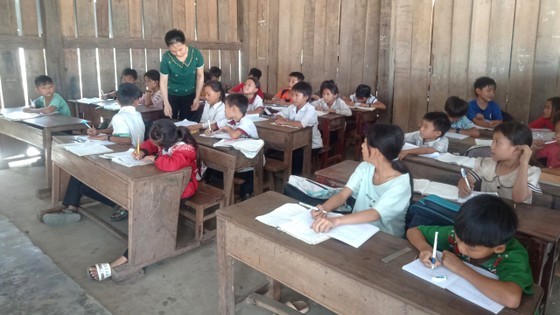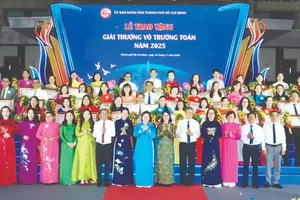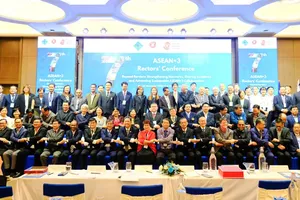 |
| A class at Mac Thi Buoi Primary School in the H'Mong village in Ea Kiet Commune of Dak Lak Province’s Cu M'gar District |
Teachers quitting the profession blamed low pay, harsh working conditions, and low remuneration affecting the quality of teaching in mountainous and poor areas.
To remove the existing shortcomings for the education sector in the Central Highlands, the Ministry of Education and Training has recently held a conference on Education and Training Development in the Central Highlands to 2030, with a vision to 2045 to implement the Politburo’s 23-NQ/TW dated October 6, 2022, on socio-economic development and ensuring national defense and security in the Central Highlands.
In a talk with an SGGP reporter on the sidelines of the conference, Minister of Education and Training Nguyen Kim Son said that one of the principles is that schools must be built in every corner of the country with enough teachers to ensure all students receive the education they deserve. The policy of the Party and State on reducing the number of people receiving salaries from the budget is a major policy in reforming the administrative apparatus.
However, each locality needs to consider the number of staff for the operation of local state machinery for submission to the Government. The Ministry of Education and Training advocates for the policy of enough teachers, both in quantity and quality structure, Minister Nguyen Kim Son emphasized.
Regarding the goals and solutions for education and training development of the Central Highlands region to 2030 with a vision to 2045, Minister of Education and Training Nguyen Kim Son emphasized, localities in the region should focus on improving the quality of human resources, especially for areas where ethnic minorities are living. This should be considered one of the breakthroughs for the region's rapid and sustainable development.
From his point of view, high-quality training centers in Buon Ma Thuot City of Dak Lak Province and Da Lat City of Lam Dong Province should be built while universities and colleges should be expanded. Moreover, investment in the development of the Tay Nguyen University and the Da Lat University is a high priority in addition to increased linkages and cooperation to train highly qualified human resources and occupations to meet regional development requirements.
Talking about present education in the special regions, Vice Chairman of Dak Nong Provincial People's Committee Ton Thi Ngoc Hanh said that public educational institutions are far short of teachers adding that the province's education sector is short of more than 1,000 teachers; plus, facilities have not met regulations resulting in the goal of new educational programs and projects have not been met.
Therefore, Dak Nong Province has proposed to competent agencies to supplement more teaching staff for the province's quota of the education sector. At the same time, the province suggested the Ministry of Education and Training, central ministries and agencies continue to invest in building and renovating more schools and classrooms to help Dak Nong Province complete the preschool education development project in the period 2018-2025 and the project on universalizing preschool for children 3-4 years old.
According to Ms. Y Ngoc, Vice Chairman of Kon Tum Provincial People's Committee, the Kon Tum Provincial People's Committee has asked the Ministry of Education and Training to petition the Government to study and issue policies to support the development of mountainous education, including a special incentive mechanism to encourage teachers in remote areas. In addition, the provincial People's Committee also proposed the Ministry of Home Affairs not cut 10 percent of official teachers.
Vice Rector of Da Lat University Mai Minh Nhat said that there should be preferential policies for students majoring in pedagogy. Currently, Da Lat University is training 12,000 students of 41 different majors. In addition, the school also offers 10 master's and 6 doctoral programs to provide highly qualified human resources for the Central Highlands and some other localities.
Presently, the Da Lat University has students of 9 pedagogical training majors who are enjoying many preferential regimes. The Decree 116/2020/ND-CP stipulates that a student of pedagogy major receives VND3.63 million monthly for living expenses during learning time.
Furthermore, currently, students from ethnic minority groups whose families’ economic condition in poor and near-poor line and belonging to the group of 16 ethnic minorities are receiving a subsidy of VND 120,000 a month each. This subsidy is an assurance that can vastly reduce financial stress and help ethnic minority students focus more on their studies.
From 2016 to 2021, the Da Lat University has mobilized sponsors to give VND 24 billion in scholarships for students with difficult circumstances, especially students who are ethnic minorities. Last but not least, during the year the country was affected by the Covid-19 epidemic, the school has exempted and reduced tuition fees for students, helping them overcome difficulties.
























